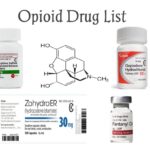List of The 10 Most Abused Prescription Drugs Globally

Prescription drug abuse refers to the non-medical use or excessive use of prescription medications. It involves taking prescription drugs in a manner or dosage other than prescribed by a healthcare professional or using medications that are prescribed to someone else. This behavior is considered abuse because it goes against the intended use and instructions provided by the prescribing doctor.
Prescription drug abuse can take several forms, including:
1. Taking higher doses: Using larger quantities of the medication than prescribed, often in an attempt to intensify the desired effects or to achieve a euphoric high.
2. Taking medications more frequently: Using prescription drugs more frequently than directed, such as taking doses closer together or taking them throughout the day rather than as prescribed.
3. Using medication for non-medical purposes: Using prescription drugs to experience effects unrelated to their intended purpose, such as using sedatives to induce relaxation or opioids for recreational purposes.
4. Combining medications: Mixing different prescription drugs or combining them with alcohol or other substances to enhance their effects, which can be extremely dangerous and increase the risk of adverse reactions and overdose.
5. Obtaining prescription drugs illegally: Acquiring prescription medications without a valid prescription, either through purchasing them on the black market, stealing them, or obtaining them from friends or family members.
Prescription drug abuse can have serious consequences for an individual’s health and well-being. It can lead to dependence, addiction, physical and psychological health issues, overdose, and even death. According to the World Health Organization (WHO), report released in 2021, there were an estimated 115,000 opioid-related deaths worldwide. However, it is important to note that this figure includes both prescription opioids and illicitly manufactured opioids like heroin.
The exact number of deaths attributed to prescription drug abuse can vary from year to year and across different regions or countries. The data on prescription drug abuse deaths are typically collected and reported by national health agencies, such as the Centers for Disease Control and Prevention (CDC) in the United States or the National Health Service (NHS) in the United Kingdom.
It is important to use prescription medications only as directed by a healthcare professional and to properly dispose of any unused medications to prevent their misuse. If you suspect someone is abusing prescription drugs, it is crucial to encourage them to seek help from a healthcare provider or addiction specialist.
List of The 10 Most Abused Prescription Drugs Globally
It is important to note that the landscape of drug abuse can vary across different regions and countries. However, here is a list of 10 commonly abused prescription drugs that have been reported as significant concerns globally:
1. Opioids: Opioid painkillers like oxycodone (OxyContin), hydrocodone (Vicodin), and fentanyl are widely abused due to their potent pain-relieving and euphoric effects. They have a high risk of addiction and overdose.
2. Benzodiazepines: Drugs such as diazepam (Valium), alprazolam (Xanax), and lorazepam (Ativan) are central nervous system depressants used to treat anxiety and sleep disorders. They are often abused for their sedating and calming effects.
3. Stimulants: Medications like amphetamines (Adderall) and methylphenidate (Ritalin) prescribed for ADHD and narcolepsy can be abused for their stimulating and focus-enhancing effects.
4. Codeine: A commonly prescribed opioid used for pain relief and cough suppression. It is prone to abuse due to its sedative and analgesic properties.
5. Tramadol: An opioid-like pain medication used to treat moderate to severe pain. It can produce euphoria and is susceptible to misuse and abuse.
6. Zolpidem: A sedative-hypnotic drug marketed as Ambien, primarily used to treat insomnia. It can induce relaxation and euphoria when used improperly.
7. Methadone: An opioid used in medication-assisted treatment for opioid addiction and for pain management. It can be abused for its similar effects to other opioids.
8. Adderall: A stimulant medication prescribed for ADHD. It is sometimes misused as a “study drug” to enhance focus and academic performance.
9. Ritalin: A stimulant medication used to treat ADHD. It is also misused for its stimulant effects, particularly by students seeking increased concentration.
10. Pregabalin: An anticonvulsant medication used to treat epilepsy, neuropathic pain, and anxiety disorders. It can produce sedation and relaxation and is occasionally misused for its calming effects.
This list is not exhaustive, and the prevalence and specific drugs of abuse may vary in different regions or countries. It is essential to promote the responsible use of prescription medications and to seek professional help if you or someone you know is struggling with substance abuse.
Health Effects of Prescription Drugs Abuse
Prescription drug abuse can have various detrimental health effects on individuals. The specific effects can depend on the type of drug being abused and the individual’s unique circumstances. Here are some common health consequences associated with prescription drug abuse:
1. Addiction: Prescription drugs, especially opioids, benzodiazepines, and stimulants, have a high potential for addiction. Continued misuse and abuse of these medications can lead to physical and psychological dependence, making it difficult to stop using them without professional help.
2. Overdose: Taking prescription drugs in higher doses or combining them with other substances like alcohol can increase the risk of overdose. Overdosing on opioids, benzodiazepines, or CNS depressants can result in respiratory depression, coma, and even death.
3. Mental health problems: Prolonged misuse of prescription drugs can lead to mental health issues such as anxiety, depression, and mood disorders. The misuse of stimulant medications, in particular, can cause agitation, paranoia, and even psychosis.
4. Physical health complications: Prescription drug abuse can have a range of physical health consequences. For example, opioids can cause constipation, respiratory problems, and hormonal imbalances. Benzodiazepines and CNS depressants can impair coordination, memory, and judgment. Stimulant abuse can lead to high blood pressure, heart problems, and an increased risk of seizures.
5. Withdrawal symptoms: When individuals become dependent on prescription drugs and abruptly stop using them or try to quit without medical supervision, they may experience withdrawal symptoms. These symptoms can include intense cravings, anxiety, nausea, vomiting, muscle aches, insomnia, and in severe cases, seizures.
6. Damage to relationships and social consequences: Prescription drug abuse can strain relationships with family, friends, and colleagues. It can lead to social isolation, financial difficulties, legal issues, and difficulties in maintaining employment or academic performance.
7. Risky behaviors: Some individuals engaged in prescription drug abuse may engage in risky behaviors such as driving under the influence, sharing needles (in the case of injected drug use), or engaging in unsafe sexual practices. These behaviors can further increase the risk of accidents, infections, and the transmission of diseases like HIV or hepatitis.
It’s important to seek professional help if you or someone you know is struggling with prescription drug abuse. Treatment options, such as detoxification, therapy, and support groups, can help individuals overcome addiction, manage withdrawal symptoms, and address any underlying mental health issues.





